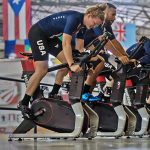It was a perfect example of industry outsiders buying into a family business and soon realizing that they had little idea how to operate effectively in this market. Shortly after private equity firm Bruckmann, Rosser, Sherrill and Co., Inc. (BRS) acquired a controlling interest in Copeland Sports in December 2002, early plans for rapid expansion and thoughts of a potential IPO soon gave way to frustration as management and buyers left the company, leaving behind a business that no longer resembled the retailer that was founded and thrived on personal relationships with vendors and a real understanding of the consumer they served.
BRS, whose portfolio companies include Au Bon Pain, California Pizza Kitchen and McCormick & Schmick’s, may have soon realized a real difference between the restaurant business and sporting goods, but the final realization came too late as the business steadily deteriorated over the last three years.
The Copeland family, which had given up control of a business they had run for 30 years, announced last week that they had bought back controlling interest in the business, an announcement that was mostly met with applause by the industry. Many had speculated over the last few months about the timing of a bankruptcy and where the real estate would end up after a filing. Now, the Copeland family has full control of the company where they had retained just 10% interest when it was sold in 2002.
The chain, which is based in San Luis Obispo, Calif., had shrunk a bit to 31 stores from the 36 doors in operation when BRS acquired control.
Copeland Sports filed for Chapter 11 bankruptcy protection in Delaware on August 14, 2006. The company also announced that it had reached agreement with Wells Fargo Retail Finance, LLC on a $25 million debtor-in-possession credit facility and that the Copeland family would make an additional secured loan to the company of $5 million, to pay down the Wells Fargo secured claim and increase borrowing availability under the credit facility.
The company, which does business under the Copeland Sports and ShopSports.com banners, listed assets of $56.6 million and outstanding liabilities of $90.6 million as of January 31, 2006 and owed approximately $23 million in pre-petition accounts payable to its vendors. There are at least 1,000 creditors involved in the filing. The companys top 25 creditors are owed roughly $10.7 million.
The largest unsecured creditor is Nike USA, Inc., which is owed nearly $1.7 million, followed by Callaway Golf with nearly $1 million in unsecured debt. Sole technology is owed nearly $626,000 and New Balance is owed almost $807,000. TaylorMade Golf rounds out the top five with trade debt of nearly $664,000. Titleist Golf, adidas America, DC Shoes, Quiksilver, and Puma round out the top ten unsecured creditors.
In court documents obtained by Sports Executive Weekly, Copelands revealed that sales and margin performance had fallen compared to previous years. The company had just $950,000 in cash on hand on August 9 and was also in default of its pre-petition lending agreement with Wells Fargo. The filing revealed what many in the industry have talked about for months, that vendors had quit shipping the retailer as the business started to contract. At the time of the filing, Copelands was receiving just $300,00 in merchandise shipments a week, which would be tough to support a business that generated $166 million in retail sales in the last fiscal year through January 2006.
In connection with the bankruptcy, Copelands has hired The Clear Thinking Group to provide consulting services and the law firm of Pachulski, Stang, Ziehl, Young, Jones & Weintraub to represent the company during Chapter 11 proceedings.
In buying back control of the business, Tom, Jim and Mike Copeland will also resume an active management role in the business. Copeland Sports also named a new CEO, Barry Soosman, who was formerly an EVP of Guitar Center, Inc.
The family said it feels that the credit facility, along with funds generated by operations, would be sufficient to meet the companys capital requirements. The retailer plans to immediately close at least eight stores that are “underperforming or are situated in overlapping markets” in an effort to focus on its profitable core operations.
“We believe that with the right approach and our knowledge of the company and the sporting goods industry, we can put the company back on a sound footing and come out of Chapter 11 quickly,” said Tom Copeland in a release.
In addition to lending the company $5 million, the Copeland family has agreed to voluntarily subordinate their lien rights as holders of over $13 million in Senior Subordinated Notes, for the benefit of vendors who agree to supply goods and services to Copeland Sports on ordinary credit terms. This commitment is intended to encourage suppliers to help restock Copeland Sports for the back-to-school and upcoming holiday seasons.
“Copeland Sports has always enjoyed strong relationships with our suppliers, and want to make sure they know they can continue to do business with the company,” Copeland said. “We built this business, and we intend to do everything possible to keep the confidence of our customers and creditors.”
Copeland Sports, which currently operates stores in California, Oregon, Nevada, and Utah, was founded in 1971 by Tom and Jim Copeland.














